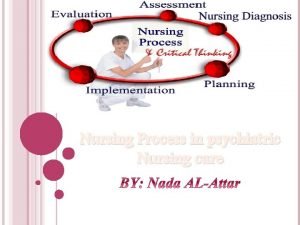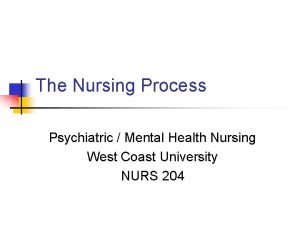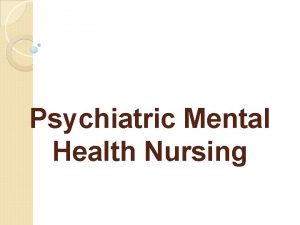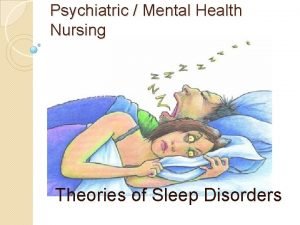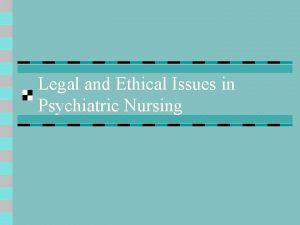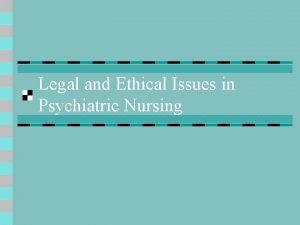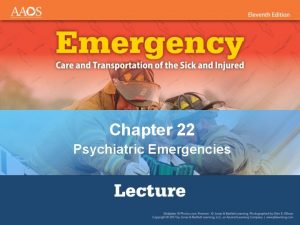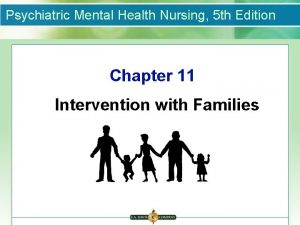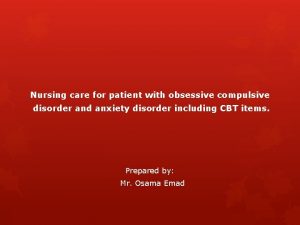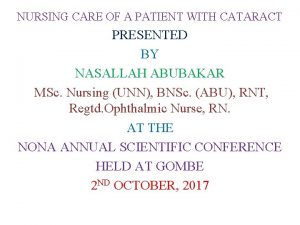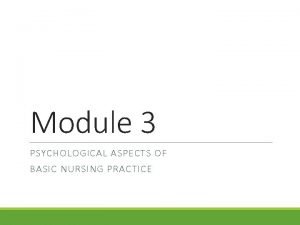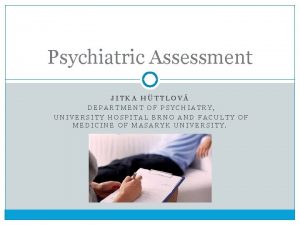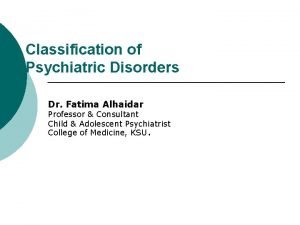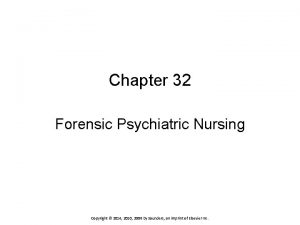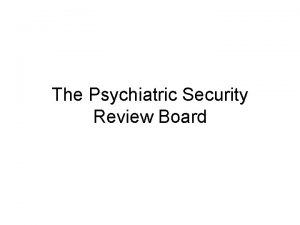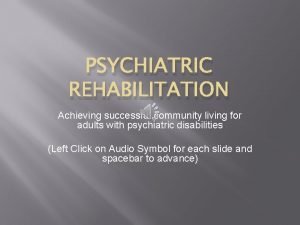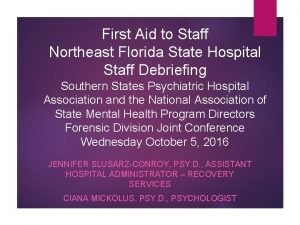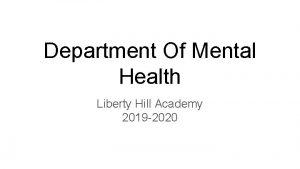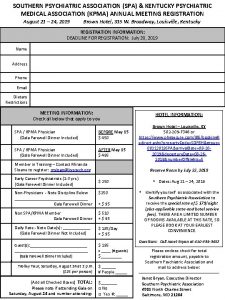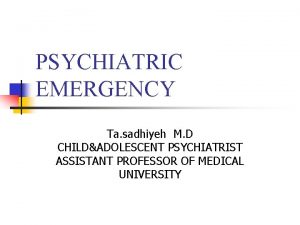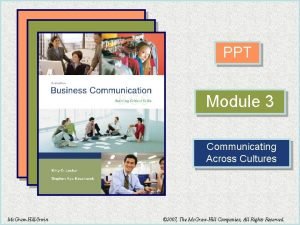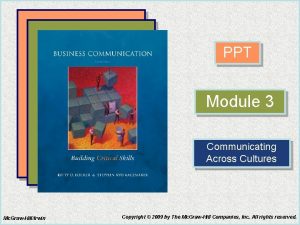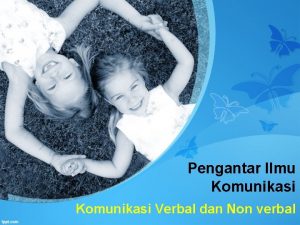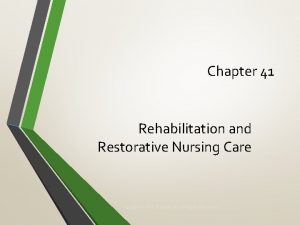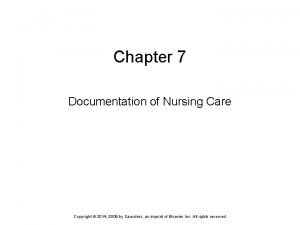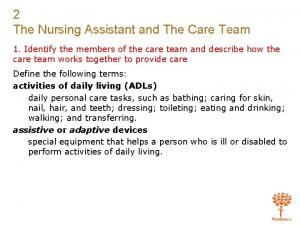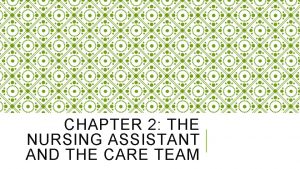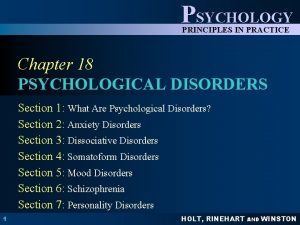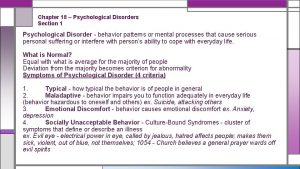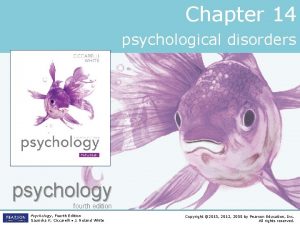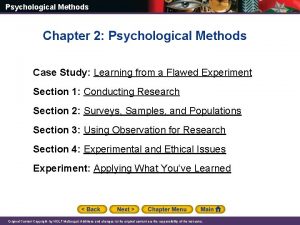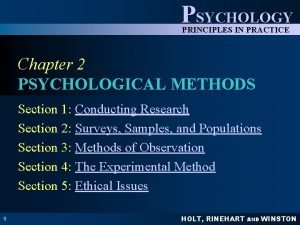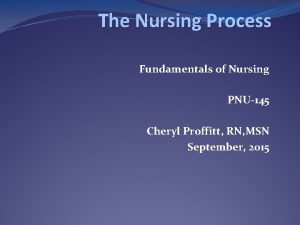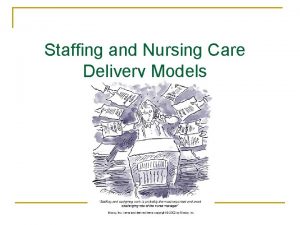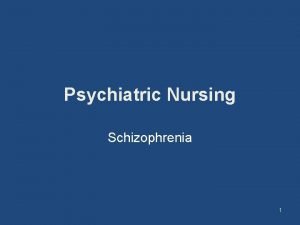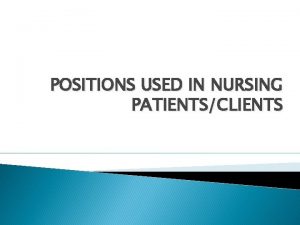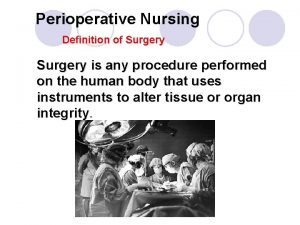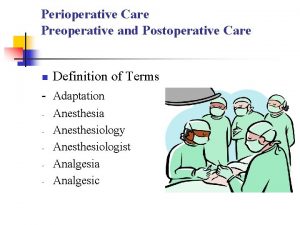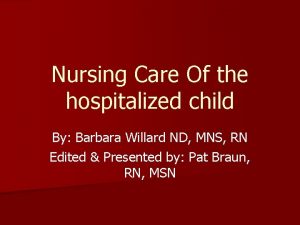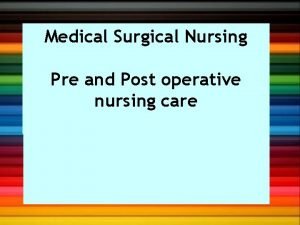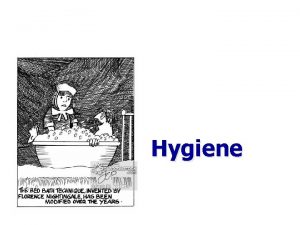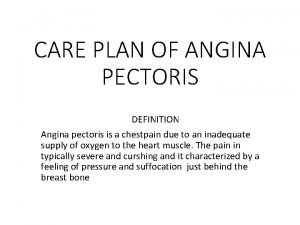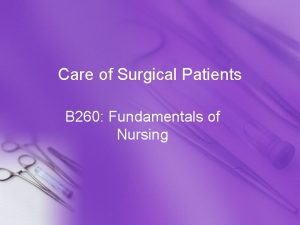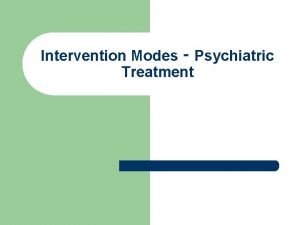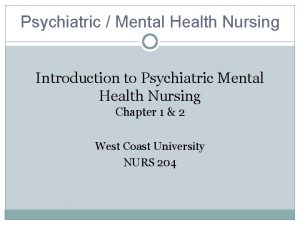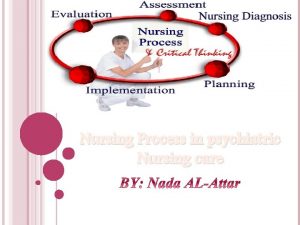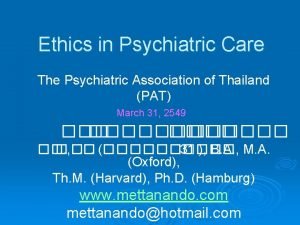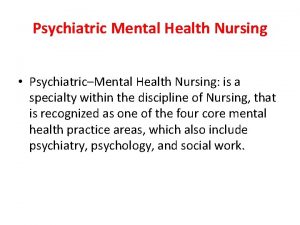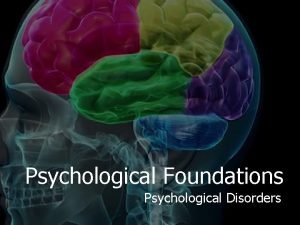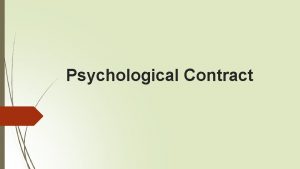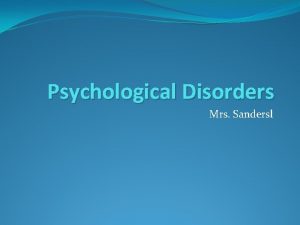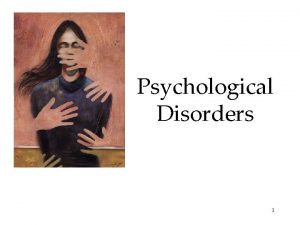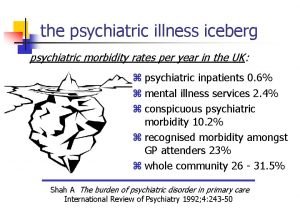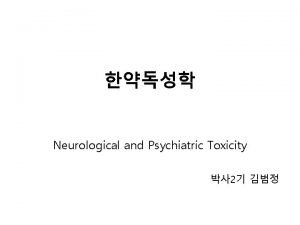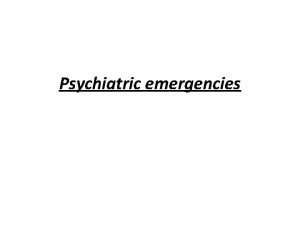Chapter 6 Psychological Context of Psychiatric Nursing Care






















































- Slides: 54

Chapter 6 Psychological Context of Psychiatric Nursing Care Mosby items and derived items © 2013, 2009 by Mosby, an imprint of Elsevier Inc.

Integrated Care Holistic psychiatric mental health nursing care requires assessment of biological, psychological, sociocultural health status In all clinical settings, nursing care should include mental status assessment Nurses should be proficient in administering mental status examinations The examination is influenced by the patient’s educational and sociocultural background Mosby items and derived items © 2013, 2009 by Mosby, an imprint of Elsevier Inc. 2

Mental Status Examination Detects changes or abnormalities in intellectual functioning, thought content, judgment, mood, affect May help identify possible brain lesions Mental status examination is to psychiatric nursing what physical examination is to general medical nursing Does not reflect patient’s past or future; evaluates patient’s current state Mosby items and derived items © 2013, 2009 by Mosby, an imprint of Elsevier Inc. 3

Nursing Approach Clinical rather than social approach Listen closely to what is said; reflect on what is not said Ø Structure process for broad exploration of many areas Ø Discover potential problems Ø Explore symptoms or maladaptive coping responses Ø Observe carefully and record specific and objective information, not global or judgmental Ø Mosby items and derived items © 2013, 2009 by Mosby, an imprint of Elsevier Inc. 4

Patient Communication Content and process important Content: overtly communicated information Ø Process: how communication occurs, including feelings, intuition, behaviors that accompany speech and thought Ø Content and process not always congruent Ø Patient may deny feeling depressed but appear sad, tearful Mosby items and derived items © 2013, 2009 by Mosby, an imprint of Elsevier Inc. 5

Awareness of Nurse’s Feelings Nurses should monitor their own feelings and reactions while implementing mental status examination Nurse’s “gut reactions” may reflect subtle patient emotions Ø Depressed patient may make nurse feel sad, and hostile patient may make nurse feel threatened angry Mosby items and derived items © 2013, 2009 by Mosby, an imprint of Elsevier Inc. 6

Categories of Mental Status Examination (Box 6 -1) General description Emotional state Experiences Thinking Sensorium and cognition Mosby items and derived items © 2013, 2009 by Mosby, an imprint of Elsevier Inc. 7

General Description Category: Appearance Include these physical characteristics: Apparent age Ø Manner of dress Ø Cleanliness Ø Posture/gait Ø Facial expressions Ø Eye contact Ø Pupil dilation or constriction Ø General state of health, nutrition Ø Mosby items and derived items © 2013, 2009 by Mosby, an imprint of Elsevier Inc. 8

Appearance: Clinical Implications Dilated pupils sometimes associated with drug intoxication Pupil constriction may indicate narcotic addiction Stooped posture often seen in depressed patients Manic patients may dress in colorful or unusual attire Mosby items and derived items © 2013, 2009 by Mosby, an imprint of Elsevier Inc. 9

General Description Category: Speech Describe speech Rate: rapid or slow Ø Volume: loud or soft Ø Amount: paucity, muteness, pressured speech Ø Characteristics: stuttering, slurring of words, unusual accents Ø Mosby items and derived items © 2013, 2009 by Mosby, an imprint of Elsevier Inc. 10

Speech: Clinical Implications Speech disturbances often caused by specific brain disturbances Ø Mumbling may occur with Huntington’s chorea, slurred speech in intoxicated patients Manic patients often show pressured speech Depressed people often reluctant to speak at all Mosby items and derived items © 2013, 2009 by Mosby, an imprint of Elsevier Inc. 11

General Description Category: Motor Activity Describe patient’s physical movements, including these observations: Level of activity: lethargic, tense, restless, agitated Ø Type of activity: tics, grimaces, tremors Ø Unusual gestures/mannerisms: compulsions Ø Mosby items and derived items © 2013, 2009 by Mosby, an imprint of Elsevier Inc. 12

Motor Activity: Clinical Implications Excessive body movement possibly from anxiety, mania, or stimulant abuse Decreased body activity suggests depression, organic disorder, catatonic schizophrenia, or drug-induced stupor Mosby items and derived items © 2013, 2009 by Mosby, an imprint of Elsevier Inc. 13

Motor Activity: Clinical Implications Tics and grimaces suggest medication side effects Repeated motor movements or compulsions may indicate obsessive-compulsive disorder Repeated picking of lint or dirt from clothing can be from delirium or toxic conditions Mosby items and derived items © 2013, 2009 by Mosby, an imprint of Elsevier Inc. 14

General Description Category: Interaction During Interview Describe how patient relates to nurse during interview: Is patient hostile, uncooperative, irritable, guarded, apathetic, defensive, suspicious, or seductive? Ø Nurse may explore nature of observed behavior by asking, “You seem irritated about something. Is that accurate? ” Ø Mosby items and derived items © 2013, 2009 by Mosby, an imprint of Elsevier Inc. 15

Interaction During Interview: Clinical Implications Suspiciousness may be evident in paranoid patients Irritability may suggest anxiety disorder Nurses must carefully examine their subjective responses based on personal and sociocultural biases; must guard against overinterpreting or misinterpreting patients’ behavior because of social or cultural differences between patients and nurses Mosby items and derived items © 2013, 2009 by Mosby, an imprint of Elsevier Inc. 16

Emotional State Category: Mood Patient’s self-report of prevailing emotional state Reflects patient’s life situation, including these observations: May ask simple, nonleading questions, e. g. , “How are you feeling today? ” Ø Does patient report feeling sad, fearful, hopeless, euphoric, or anxious? Ø Asking patient to rate his/her mood on 0 -10 scale provides immediate reading Ø Valuable to compare changes during treatment Ø Mosby items and derived items © 2013, 2009 by Mosby, an imprint of Elsevier Inc. 17

Mood: Clinical Implications Most people with depression describe feeling hopeless; 25% of those with depression have suicidal ideation Suicidal ideation also common with anxiety disorders, schizophrenia Elation common with mania If suicide potential suspected, nurse should ask patient directly about thoughts of selfharm Mosby items and derived items © 2013, 2009 by Mosby, an imprint of Elsevier Inc. 18

Assessing Suicidal Ideation Has patient wanted to harm himself/herself or someone else? Has patient made previous attempts to cause harm; if so, what events surrounded attempts? To judge patient’s suicidal or homicidal risk, assess patient’s plans, ability to carry out those plans (availability of guns) Patient’s attitude about death Support systems available to patient Mosby items and derived items © 2013, 2009 by Mosby, an imprint of Elsevier Inc. 19

Emotional State Category: Affect Patient’s apparent emotional tone Statements of emotions and nurse’s empathic responses provide clues to appropriateness of affect Describe affect by these observations: Range Ø Duration Ø Intensity Ø Appropriateness Ø Mosby items and derived items © 2013, 2009 by Mosby, an imprint of Elsevier Inc. 20

Key Terminology Flat affect Restricted or blunted Labile Incongruent Mosby items and derived items © 2013, 2009 by Mosby, an imprint of Elsevier Inc. 21

Affect: Clinical Implications Labile affect often seen with mania Flat affect and incongruent affect often evident with schizophrenia Mosby items and derived items © 2013, 2009 by Mosby, an imprint of Elsevier Inc. 22

Experiences Category: Perceptions Hallucinations Ø Ø Ø Auditory (sound) Visual (sight) Tactile (touch) Gustatory (taste) Olfactory (smell) Illusions Mosby items and derived items © 2013, 2009 by Mosby, an imprint of Elsevier Inc. 23

Hallucinations Auditory (“hearing voices”) most common Command hallucinations: tell patient to do something: to kill oneself, harm another, or join someone in afterlife Nurse might ask patient: “Do you ever see or hear things that other people don’t see or hear? ” Ø “Do you have strange experiences as you fall asleep or on awakening? ” Ø Mosby items and derived items © 2013, 2009 by Mosby, an imprint of Elsevier Inc. 24

Perceptions: Clinical Implications Auditory hallucinations suggest schizophrenia Visual hallucinations suggest organicity Tactile hallucinations suggest organic mental disorders, cocaine abuse, delirium tremors Mosby items and derived items © 2013, 2009 by Mosby, an imprint of Elsevier Inc. 25

Thinking Category: Thought Content Specific meaning expressed in patient’s communication Throughout interview, important the nurse obtains information but does not dispute patient’s beliefs Mosby items and derived items © 2013, 2009 by Mosby, an imprint of Elsevier Inc. 26

Thought Process: Clinical Implications Circumstantial thinking may be sign of defensiveness or paranoid thinking Loose associations and neologisms suggest schizophrenia or other psychotic disorders Flight of ideas indicates mania Mosby items and derived items © 2013, 2009 by Mosby, an imprint of Elsevier Inc. 27

Thinking Category: Thought Content Refers to “what” of patient’s thinking; explored by tactfully asking if patient: Has recurring, persistent thoughts Fears certain objects or situations, or excessively worries about body and health issues Ø Feels that things are strange or unreal Ø Has feeling of being outside his/her body Ø Feels singled out, watched, or talked about Ø Believes that thoughts or actions are being controlled by outside person or force Ø Claims to have psychic or other special powers or belief that others can read his/her mind Ø Ø Mosby items and derived items © 2013, 2009 by Mosby, an imprint of Elsevier Inc. 28

Thought Content: Clinical Implications Obsessions and phobias: symptoms associated with anxiety disorders Delusions, depersonalization, ideas of reference suggest schizophrenia and other psychotic disorders Mosby items and derived items © 2013, 2009 by Mosby, an imprint of Elsevier Inc. 29

Key Terminology: Thought Content Delusion Thought broadcasting Thought insertion Depersonalization Hypochondriasis Ideas of reference Magical thinking Nihilistic ideas Obsession Phobia Mosby items and derived items © 2013, 2009 by Mosby, an imprint of Elsevier Inc. 30

Thinking Category: Thought Process Refers to the “how” of patient’s self-expression Patient’s thought process observed through speech patterns or forms of verbalization rather than content Mosby items and derived items © 2013, 2009 by Mosby, an imprint of Elsevier Inc. 31

Thinking Category: Thought Process Questions to evaluate thought process Does patient’s thinking proceed in a systematic, organized, logical manner? Ø Is patient’s self-expression clear? Ø Can patient move easily from one topic to another? Ø Mosby items and derived items © 2013, 2009 by Mosby, an imprint of Elsevier Inc. 32

Thought Process: Clinical Implications Perseveration often associated with brain damage and psychotic disorders Word salad represents highest level of thought disorganization Mosby items and derived items © 2013, 2009 by Mosby, an imprint of Elsevier Inc. 33

Key Terminology: Thought Process Circumstantial Flight of ideas Loose associations Neologisms Thought blocking Perseveration Tangential Word salad Mosby items and derived items © 2013, 2009 by Mosby, an imprint of Elsevier Inc. 34

Sensorium and Cognition Category: Level of Consciousness Mental status examinations routinely assess patient’s orientation to current situation Involves evaluating some basic cognitive functions and observations Can use various terms to describe patient’s level of consciousness, e. g. , confused, sedated, stuporous Ø Also question patient regarding orientation to time, place, person Ø Mosby items and derived items © 2013, 2009 by Mosby, an imprint of Elsevier Inc. 35

Level of Consciousness: Clinical Implications Fully functioning patients may be offended by questions about orientation, so skilled nurse should integrate questions into the course of the interview Patients with organic mental disorders may give grossly inaccurate answers Orientation to person remains intact longer than orientation to time or place Patients with schizophrenic disorders may say they are someone else or somewhere else or reveal a personalized orientation to world Mosby items and derived items © 2013, 2009 by Mosby, an imprint of Elsevier Inc. 36

Sensorium and Cognition Category: Memory Quick screen for potential memory problems, not a definitive answer whether specific impairment exists May require neuropsychological assessment Mosby items and derived items © 2013, 2009 by Mosby, an imprint of Elsevier Inc. 37

Sensorium and Cognition Category: Memory Ability to recall past experiences Remote memory: recall of events, information, people from distant past Ø Recent memory: recall of events, information, people from past week or so Ø Immediate memory: recall of information or data to which person was just exposed Ø Mosby items and derived items © 2013, 2009 by Mosby, an imprint of Elsevier Inc. 38

Memory: Clinical Implications Loss of memory occurs with organic disorders, dissociative disorder, conversion disorder Patients with Alzheimer disease retain remote memory longer than recent memory Anxiety and depression can impair immediate retention, recent memory Mosby items and derived items © 2013, 2009 by Mosby, an imprint of Elsevier Inc. 39

Sensorium and Cognition: Level of Concentration and Calculation Concentration: ability to pay attention Calculation: ability to do simple math Count from 1 to 20 rapidly Ø Do simple calculations, e. g. , 2 × 3 or 21 + 7 Ø Serially subtract 7 from 100; if difficulty subtracting 7 from 100, ask to subtract 3 from 20 in the same way; or test more functional calculation: “How many nickels are in $1. 35? ” Ø Mosby items and derived items © 2013, 2009 by Mosby, an imprint of Elsevier Inc. 40

Concentration and Calculation: Clinical Implications Many psychiatric illnesses impair ability to concentrate and complete simple calculations Particularly important to differentiate among organic mental disorder, anxiety, depression Mosby items and derived items © 2013, 2009 by Mosby, an imprint of Elsevier Inc. 41

Sensorium and Cognition Category: Information and Intelligence Controversial areas of assessment Be cautious about judging intelligence after brief, limited contact typical of time needed to conduct a mental status examination Information in this category is highly influenced by sociocultural factors of nurse, patient, treatment setting Mosby items and derived items © 2013, 2009 by Mosby, an imprint of Elsevier Inc. 42

Intelligence Includes talents people express in the arts, athletics, ability to work cooperatively with people, self-definition Verbal and mathematical skills usually assessed in standard intelligence tests Take a broad approach to assessment of intellectual functioning, allowing for identification of intellectual strengths, skills, abilities that may otherwise be overlooked Mosby items and derived items © 2013, 2009 by Mosby, an imprint of Elsevier Inc. 43

Intelligence: Observations Assess patient’s last grade of schooling completed General knowledge, use of vocabulary Level of literacy Test ability to conceptualize and abstract by having patient explain a series of proverbs Mosby items and derived items © 2013, 2009 by Mosby, an imprint of Elsevier Inc. 44

Assessing Intelligence If educational level is low, ask patient to list similarities between a series of paired objects to assess ability for abstract thinking To assess general knowledge, ask patient to name last three presidents, five large cities, or occupation of well-known person Mosby items and derived items © 2013, 2009 by Mosby, an imprint of Elsevier Inc. 45

Information and Intelligence: Clinical Implications Carefully evaluate educational level and any learning disabilities Rule out mental retardation whenever possible Level of literacy may be part of a general assessment but is also an important factor in any health teaching or didactic information presented to patient Mosby items and derived items © 2013, 2009 by Mosby, an imprint of Elsevier Inc. 46

Sensorium and Cognition Category: Judgment Involves making constructive and adaptive decisions Ability to understand facts and draw conclusions from relationships Evaluated by exploring involvement in activities, relationships, vocational choices Mosby items and derived items © 2013, 2009 by Mosby, an imprint of Elsevier Inc. 47

Assessing Judgment Present hypothetical situations What would you do if you found a stamped, addressed envelope lying on the ground? Ø How would you find your way out of a forest in the daytime? Ø What would you do if you entered your house and smelled gas? Ø If you won $10, 000, what would you do with it? Ø Mosby items and derived items © 2013, 2009 by Mosby, an imprint of Elsevier Inc. 48

Judgment: Clinical Implications Judgment impaired in organic mental disorders, schizophrenia, psychotic disorders, intoxication, borderline or low IQ Also may be impaired in manic patients and those with personality disorders Mosby items and derived items © 2013, 2009 by Mosby, an imprint of Elsevier Inc. 49

Sensorium and Cognition Category: Insight Patient’s understanding of problem/illness Does patient accept or deny illness? Ask whether patient blames problem on someone else or some external factors Ø What does patient think about current situation? Ø What does patient want others, including nurse, to do about it? Ø Mosby items and derived items © 2013, 2009 by Mosby, an imprint of Elsevier Inc. 50

Insight: Clinical Implications Insight impaired in those with many psychotic illnesses, including organic mental disorders, psychosis, substance abuse, eating disorders, personality disorders, borderline or low IQ Whether patient sees need for treatment also critically affects therapeutic alliance, setting of mutual goals, implementation of treatment plan, and future adherence to it Mosby items and derived items © 2013, 2009 by Mosby, an imprint of Elsevier Inc. 51

Documentation Make mental status examination written reports brief, clear, concise Address all categories of information May use an outline format completed with short answers May use computerized format Record verbatim responses by patient whenever he or she adds important information, to support nurse’s assessment Mosby items and derived items © 2013, 2009 by Mosby, an imprint of Elsevier Inc. 52

Mini-Mental Status Exam Simplified, scored form of cognitive mental status examination that concentrates on only cognitive aspects of mental functions Consists of 11 questions; requires only 5 to 10 minutes to administer Can be used quickly and routinely Excludes questions concerning mood, abnormal psychological experiences, content or process of thinking Mosby items and derived items © 2013, 2009 by Mosby, an imprint of Elsevier Inc. 53

Use of Behavioral Rating Scales Measures extent of patient’s problems Helps make accurate diagnosis Tracks patient’s progress over time Documents effectiveness/success of treatment Mosby items and derived items © 2013, 2009 by Mosby, an imprint of Elsevier Inc. 54
 Ineffective childbearing process example
Ineffective childbearing process example Nursing process in psychiatric nursing
Nursing process in psychiatric nursing Definition of mental health nursing
Definition of mental health nursing History of psychiatric nurse
History of psychiatric nurse Remalteon
Remalteon Ethical and legal issues in psychiatric nursing
Ethical and legal issues in psychiatric nursing Ethical issues in psychiatric nursing
Ethical issues in psychiatric nursing Chapter 22 psychiatric emergencies
Chapter 22 psychiatric emergencies Chapter 11 psychiatric mental health nursin
Chapter 11 psychiatric mental health nursin Ocd nursing care plan
Ocd nursing care plan Nursing diagnosis for cataracts
Nursing diagnosis for cataracts Primary secondary tertiary health care definition
Primary secondary tertiary health care definition Module 3 psychological factors
Module 3 psychological factors Mse psychiatry
Mse psychiatry Neurosis vs psychosis
Neurosis vs psychosis Cmc psychiatric hospital
Cmc psychiatric hospital Role of psychiatric nurse
Role of psychiatric nurse Psychiatric security review board
Psychiatric security review board Psychiatric rehabilitation
Psychiatric rehabilitation Psychiatric nurse conference
Psychiatric nurse conference American psychiatric association annual meeting 2020
American psychiatric association annual meeting 2020 Nefsh
Nefsh Liberty hill academy
Liberty hill academy Southern psychiatric association
Southern psychiatric association Psychiatric emergencies
Psychiatric emergencies Psychiatric emergency
Psychiatric emergency Nonagist
Nonagist Communicating across generational differences
Communicating across generational differences Constancy under negation examples
Constancy under negation examples Soal essay komunikasi nonverbal
Soal essay komunikasi nonverbal Chapter 41 rehabilitation and restorative nursing care
Chapter 41 rehabilitation and restorative nursing care Example of pie charting in nursing
Example of pie charting in nursing Chapter 2 the nursing assistant and the care team
Chapter 2 the nursing assistant and the care team Chapter 2 foundations of resident care
Chapter 2 foundations of resident care Chapter 18 psychological disorders review worksheet
Chapter 18 psychological disorders review worksheet Chapter 18 psychological disorders
Chapter 18 psychological disorders Chapter 14 psychological disorders
Chapter 14 psychological disorders Chapter 2 psychological methods
Chapter 2 psychological methods Psychology principles in practice
Psychology principles in practice Chapter 14 psychological disorders
Chapter 14 psychological disorders Ap psychology chapter 15 psychological disorders
Ap psychology chapter 15 psychological disorders Team nursing care delivery model
Team nursing care delivery model Problem statement nursing examples
Problem statement nursing examples Primary nursing care delivery model
Primary nursing care delivery model Schizophrenia meaning
Schizophrenia meaning Left sims position
Left sims position Post operative nursing management
Post operative nursing management Preoperative care definition
Preoperative care definition Nursing care of hospitalized child
Nursing care of hospitalized child Post operative nursing care
Post operative nursing care Nail care procedure in nursing
Nail care procedure in nursing Gingivitis nursing diagnosis
Gingivitis nursing diagnosis Hernia nursing care plan
Hernia nursing care plan Nursing care plan for angina
Nursing care plan for angina Post operative nursing care
Post operative nursing care
